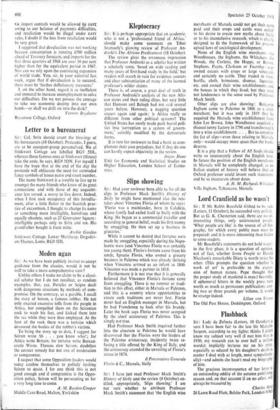Sir: I have just read Professor Mack Smith's History of
Sicily and the review (4 October) en- titled, appropriately, 'Slips showing.' I am not sure whether to attribute Professor Mack Smith's statement that 'the English wine
merchants of Marsala could not get their rents paid and their crops and cattle were stolen' to his desire to create new myths about Sicily or to his inconclusive research, which is clearly designed to fit the framework of his precon- ceived laws of sociological development.
None of the English wine merchants—the Woodhouses, the Inghams, the Whitakers. the Woods, the Corletts, the Hopps, or Brown. Stephens, Payne, Clarkson or Fearnley—ever owned estates with crops or large vineyards and certainly no cattle. They traded in wine, barilla, cloth, brimstone, shumac, liquorice, etc, and owned their wine establishments and the houses in which they lived; but they were not landowners in the sense used by Professor Mack Smith.
Other slips are also showing: Benjamin Ingham came to Palermo in 1806 as a cloth merchant, but it was only in 1819 that he acquired the Marsala wine establishment from John Lee Brown. John Woodhouse acquired a disused tunny factory in 1796 and transformed it into a wine establishment. . . . But to complete the list of slips—even those relating to Marsala only—would occupy more space than the books deserve.
It is a pity that a Fellow of All Souls should write so inaccurately about the English here. In future the position of the English merchants in Marsala will be completely changed, as no Italian student of history will believe that an Oxford professor could invent such statement, and be so inaccurate about dates.














































 Previous page
Previous page